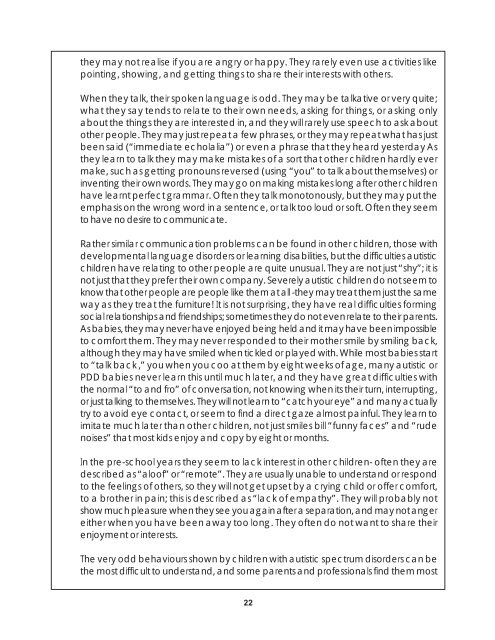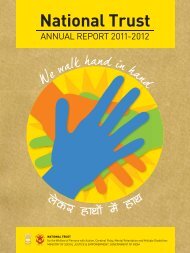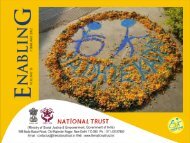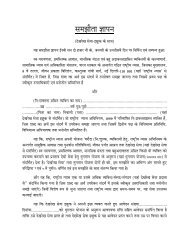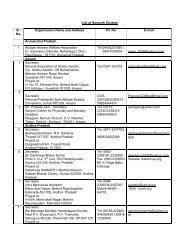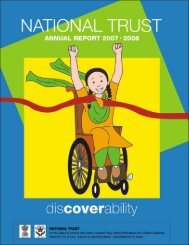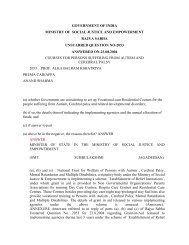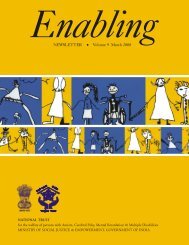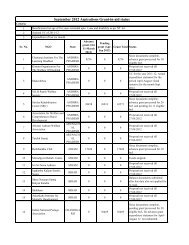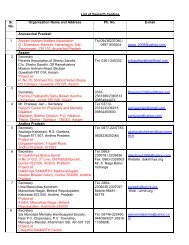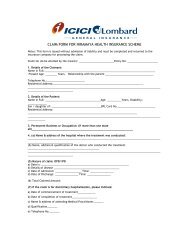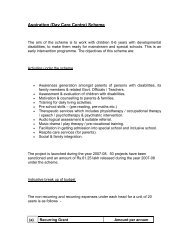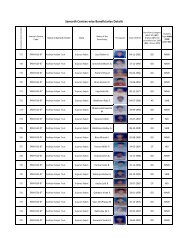INTRODUCTION - National Trust
INTRODUCTION - National Trust
INTRODUCTION - National Trust
Create successful ePaper yourself
Turn your PDF publications into a flip-book with our unique Google optimized e-Paper software.
they may not realise if you are angry or happy. They rarely even use activities like<br />
pointing, showing, and getting things to share their interests with others.<br />
When they talk, their spoken language is odd. They may be talkative or very quite;<br />
what they say tends to relate to their own needs, asking for things, or asking only<br />
about the things they are interested in, and they will rarely use speech to ask about<br />
other people. They may just repeat a few phrases, or they may repeat what has just<br />
been said (“immediate echolalia”) or even a phrase that they heard yesterday As<br />
they learn to talk they may make mistakes of a sort that other children hardly ever<br />
make, such as getting pronouns reversed (using “you” to talk about themselves) or<br />
inventing their own words. They may go on making mistakes long after other children<br />
have learnt perfect grammar. Often they talk monotonously, but they may put the<br />
emphasis on the wrong word in a sentence, or talk too loud or soft. Often they seem<br />
to have no desire to communicate.<br />
Rather similar communication problems can be found in other children, those with<br />
developmental language disorders or learning disabilities, but the difficulties autistic<br />
children have relating to other people are quite unusual. They are not just “shy”; it is<br />
not just that they prefer their own company. Severely autistic children do not seem to<br />
know that other people are people like them at all -they may treat them just the same<br />
way as they treat the furniture! It is not surprising, they have real difficulties forming<br />
social relationships and friendships; sometimes they do not even relate to their parents.<br />
As babies, they may never have enjoyed being held and it may have been impossible<br />
to comfort them. They may never responded to their mother smile by smiling back,<br />
although they may have smiled when tickled or played with. While most babies start<br />
to “talk back ,” you when you coo at them by eight weeks of age, many autistic or<br />
PDD babies never learn this until much later, and they have great difficulties with<br />
the normal “to and fro” of conversation, not knowing when its their turn, interrupting,<br />
or just talking to themselves. They will not learn to “catch your eye” and many actually<br />
try to avoid eye contact, or seem to find a direct gaze almost painful. They learn to<br />
imitate much later than other children, not just smiles bill “funny faces” and “rude<br />
noises” that most kids enjoy and copy by eight or months.<br />
In the pre-school years they seem to lack interest in other children- often they are<br />
described as “aloof” or “remote”. They are usually unable to understand or respond<br />
to the feelings of others, so they will not get upset by a crying child or offer comfort,<br />
to a brother in pain; this is described as “lack of empathy”. They will probably not<br />
show much pleasure when they see you again after a separation, and may not anger<br />
either when you have been away too long. They often do not want to share their<br />
enjoyment or interests.<br />
The very odd behaviours shown by children with autistic spectrum disorders can be<br />
the most difficult to understand, and some parents and professionals find them most<br />
22


